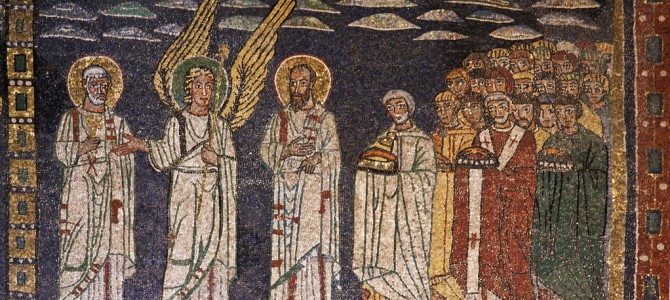An earlier version of this article mischaracterized the Christian holiday of Easter. It is the celebration of Jesus’s resurrection from the dead, not his resurrection into heaven.
—The New York Times, April 1, 2013
An earlier version of this article misquoted a comment from Malachy McCourt on St. Patrick. Mr. McCourt said, “My attitude is, St. Patrick banished the snakes from Ireland and they all came here and they became conservatives.” He did not say St. Patrick banished the slaves from Ireland.
—The New York Times, March 17, 2014
An earlier version of this review misspelled the title of the book. It’s “The English Standard Version Bible: Containing the Old and New Testaments with Apocrypha” not the “The English Standard Version Bible: Containing the Apocryphal Old and New Testaments.” Christians, in fact, strongly dispute that anything contained in the Bible itself is “apocryphal.” We apologize for the confusion.
Further, many biblical scholars take issue with the review’s characterization of Good Friday as “the Christian holiday in which it is believed that Jesus, a revered prophet, gave his life to save a penitent thief.” Other details about the holiday were also inaccurate. The article originally reported that “[Good Friday] nevertheless resonates in popular culture today in the commonplace invocation of the phrase, ‘Thank God It’s Friday,’ supposedly uttered by Jesus when he was arrested in the Garden of Eden by the Roman Emperor Pontius Pilate. The saying, abbreviated as ‘TGIF,’ was scrawled upon a placard placed above the crucified holy man.” That entire paragraph has been struck and the legal department wants to issue a sincere apology if the Times inadvertently violated the trademarks of a popular chain restaurant.
It has also come to our attention that Feast of the Transfiguration is not about “Moses and the Buddha meeting the wandering rabbi on a mountaintop while traveling to a wedding in the region of Cana, more famous for an Israeli massacre of innocent civilians in the 2006 Lebanon War.” So far as we know, these historical figures were not contemporaries, and a Google search reveals that the only written reference to them being together is contained in The Worst of Truly Tasteless Jokes. And while the events of the Bible do take place in Israeli-occupied Palestine, the territory is still better known for events that occurred there millenia ago, even before Yassir Arafat was awarded a Nobel Peace Price.
Though there is scholarly dispute over the details (according to renowned scriptural authorities like Karen Armstrong, there are at least twenty-three accounts of Jesus’s life, or “gospels”) there is no evidence the so-called “Good Samaritan” was a member of a caste that was almost entirely HIV-positive and therefore shunned by the Pharisees and Christians of the era. Despite complaints from many readers and Biblical scholars, the Times is standing by the assertion that the parable of the Good Samaritan is “mostly unknown in the modern literate world though cultural echoes of this event may still be found in the work of Macklemore.”
Additionally, there is some evidence that Ash Wednesday and other events on the liturgical calendar have roots in the medieval era, but historians define the medieval period more narrowly than “lasting from the Empire of Charlemagne to Roe v. Wade in which the Catholic Church waged unceasing war against all knowledge, inquiry, and intellect.” The source of modern Ash Wednesday ashes remain a source of some controversy and is the topic of law-enforcement investigation in several jurisdictions, as Scientists willing to defend the truth of global warming continue to disappear. As a result, we could find no climatologists willing to support the contention put forth in the article that the carbon footprint of Christians burning ashes for a pointless symbolic purpose is responsible for Micronesia being completely underwater by 2025.
Finally, Orthodox believers do not believe that Santa Claus announced the Christ Child to the shepherds, or that elves were sent by Herod to kill Joseph in Egypt. It is also not customary for Christians to yell “Who DAT!” throughout worship services on All Saints Day. It turns out that the 12 days of Christmas have no relationship to a lobbying campaign by the American Manufacturers Association and the American Retail Association. And Easter is not “a celebration of the miraculous return of Cadbury eggs.”
The New York Times regrets the errors.









